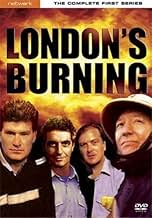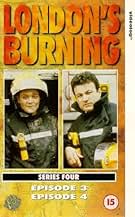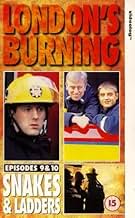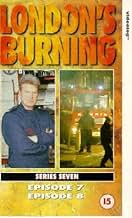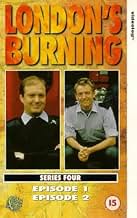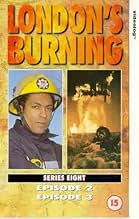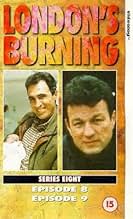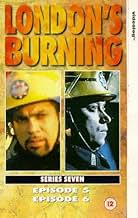Ajouter une intrigue dans votre langueBritish drama following the professional and personal lives of firefighters who put their lives on the line at Blackwall Fire Station in London, England.British drama following the professional and personal lives of firefighters who put their lives on the line at Blackwall Fire Station in London, England.British drama following the professional and personal lives of firefighters who put their lives on the line at Blackwall Fire Station in London, England.
- Nominé pour le prix 1 BAFTA Award
- 1 victoire et 2 nominations au total
Parcourir les épisodes
Histoire
Le saviez-vous
- AnecdotesSeveral of the location shoots throughout the entire series were shot in Cambridgeshire and involved not just the cast and real firefighters from the London fire brigade but also featured crews from Cambridge fire and rescue service too.
- ConnexionsFeatured in Alright on the Night's Cockup Trip (1996)
Commentaire en vedette
Being almost the last entertainment available on sunday nights before the grind of a new week, Londons burning with its up beat easy going jazzi music score as well as its distictive closing credit music was staple viewing in the UK through the 1990's. In fact we were first introduced to blue watch in a one off film in 1986 which could have easily been a pilot to the series. When then the series aired in 1988 most of the original watch from the film had returned to blackwall fire station. However, by this time the UK was in the midst of the heady days of Thatchers economic boom where the term Yuppie and Dinkis were became common phrases, a sharp contrast to the the grim events of the 1986 film.
That being said the UK prided itself with its down to earth working class early evening soap operas where ordinary people were just trying to get by dealing with all the everyday challenges in life. By contrast in the USA, all there soaps centered on wealth, power, ambition and revenge. The men despite their pearly white teeth and beach boy looks were shallow cartoon characters and the women although glamerous were one dimension barbi dolls. Although entertaining in their own right, those shows were not in any way a fair reflection of real people and there societies. By contrast, Londons burning was about fire fighters so it easily fitted into the type of tv which the UK had become accustomed to.
Looking back now I suspect that the producers left a lot of scenes on the cutting room floor as they tried to get the right balance of seriousness, humor, drama, character development as well as the action with the shouts. It was successful because the stories were entertaining, the show never dwelled on sentimentality or over played its hand in human interest or on the themes of social justice. Despite the deaths and some human tragedy, it was easy watching and the audience figures which were as high as 16 million were only a testament to this. The show really hit the sweet spot and entered the national consciousness probably between series 3 through 8. Although, seasons 9 and 10 were fairly solid, but you could just feel the air coming out of the show. After watching selected episodes on YouTube over the last 18 months I wasn't impressed with series 11 - 14.
The personnel turnover on the watch which may have been quite normal in the fire service, was eventually too much for the series. From the end of season 2 to the end of season 3 Vaseline, Tony, Charisma and station officer Tate left and the Bambi eyed Josie would also make way sometime between seasons 3-4. Malcolm left the show during season 5, replacements Kate and Colin left at the end of 5 and 6 respectively, then with the loss of Bayleaf, Kevin and Hallam during seasons 8 and 9, there were very few of the original cast left. Even Bullstrode and Scase who made reacuring rolls throughout the series were written out by the end of season 8, so overall l it think it all eventually all took it's toll.
Obviously new characters had to be introduced but with fireman from Australia, as well as European exchange firefighters, there was a sense that the show was losing its soul. The UK became more embroiled with the greater European project and I'm not sure blue watch were a good fit for the so-called hip Tony Blair years of "cool Brittania" where bacon butties, mugs of tea, pints of beer, and beefburger and chips gave way to designer drinks, lattes, wholegrain pasta and organic broccoli. Even the brown uniforms introduced made the firefighters look like a cross between maximum security prisoners and the Swiss Navy.
The proliferation of satelite tv and what they had to offer from America put pressure on terrestial tv for its viewing shares. Consequently, in an an attempt to keep up, the show changed its theme tune and tried to become more macho, middle class with squared jawed and well groomed fireman, hardly the fire fighting type. The women also had to be sexy and tough with tatoos. Was this a reflection of where society was moving or was it delving into american soap territory?
Either way, they couldnt keep up with the type of entertainment that younger viewers wanted and they alienated the older viewers. In the end the show ended in a trainwreck (no pun intended). Looking back. Perhaps the scene at bayleafs resturant at the end of season 8 where most of the watch were singing "smoke get's in your eyes" should have been the swan song for the series, after that as a reflection of how the country was changing the show began to lose its charm. All in all watching it today its a nostalgic strip down memory lane to a London that is forever lost and when British tv was great.
That being said the UK prided itself with its down to earth working class early evening soap operas where ordinary people were just trying to get by dealing with all the everyday challenges in life. By contrast in the USA, all there soaps centered on wealth, power, ambition and revenge. The men despite their pearly white teeth and beach boy looks were shallow cartoon characters and the women although glamerous were one dimension barbi dolls. Although entertaining in their own right, those shows were not in any way a fair reflection of real people and there societies. By contrast, Londons burning was about fire fighters so it easily fitted into the type of tv which the UK had become accustomed to.
Looking back now I suspect that the producers left a lot of scenes on the cutting room floor as they tried to get the right balance of seriousness, humor, drama, character development as well as the action with the shouts. It was successful because the stories were entertaining, the show never dwelled on sentimentality or over played its hand in human interest or on the themes of social justice. Despite the deaths and some human tragedy, it was easy watching and the audience figures which were as high as 16 million were only a testament to this. The show really hit the sweet spot and entered the national consciousness probably between series 3 through 8. Although, seasons 9 and 10 were fairly solid, but you could just feel the air coming out of the show. After watching selected episodes on YouTube over the last 18 months I wasn't impressed with series 11 - 14.
The personnel turnover on the watch which may have been quite normal in the fire service, was eventually too much for the series. From the end of season 2 to the end of season 3 Vaseline, Tony, Charisma and station officer Tate left and the Bambi eyed Josie would also make way sometime between seasons 3-4. Malcolm left the show during season 5, replacements Kate and Colin left at the end of 5 and 6 respectively, then with the loss of Bayleaf, Kevin and Hallam during seasons 8 and 9, there were very few of the original cast left. Even Bullstrode and Scase who made reacuring rolls throughout the series were written out by the end of season 8, so overall l it think it all eventually all took it's toll.
Obviously new characters had to be introduced but with fireman from Australia, as well as European exchange firefighters, there was a sense that the show was losing its soul. The UK became more embroiled with the greater European project and I'm not sure blue watch were a good fit for the so-called hip Tony Blair years of "cool Brittania" where bacon butties, mugs of tea, pints of beer, and beefburger and chips gave way to designer drinks, lattes, wholegrain pasta and organic broccoli. Even the brown uniforms introduced made the firefighters look like a cross between maximum security prisoners and the Swiss Navy.
The proliferation of satelite tv and what they had to offer from America put pressure on terrestial tv for its viewing shares. Consequently, in an an attempt to keep up, the show changed its theme tune and tried to become more macho, middle class with squared jawed and well groomed fireman, hardly the fire fighting type. The women also had to be sexy and tough with tatoos. Was this a reflection of where society was moving or was it delving into american soap territory?
Either way, they couldnt keep up with the type of entertainment that younger viewers wanted and they alienated the older viewers. In the end the show ended in a trainwreck (no pun intended). Looking back. Perhaps the scene at bayleafs resturant at the end of season 8 where most of the watch were singing "smoke get's in your eyes" should have been the swan song for the series, after that as a reflection of how the country was changing the show began to lose its charm. All in all watching it today its a nostalgic strip down memory lane to a London that is forever lost and when British tv was great.
- dgrahamwatson
- 19 oct. 2018
- Lien permanent
Meilleurs choix
Connectez-vous pour évaluer et surveiller les recommandations personnalisées
- How many seasons does London's Burning have?Propulsé par Alexa
Détails
- Date de sortie
- Pays d’origine
- Langue
- Aussi connu sous le nom de
- Лондон горит
- Lieux de tournage
- Leyton Fire Station, Church Road, Leyton, Londres, Angleterre, Royaume-Uni(exterior of Blackwall Fire Station 2001-2002)
- société de production
- Consultez plus de crédits d'entreprise sur IMDbPro
Contribuer à cette page
Suggérer une modification ou ajouter du contenu manquant

Lacune principale
By what name was London's Burning (1988) officially released in India in English?
Répondre


